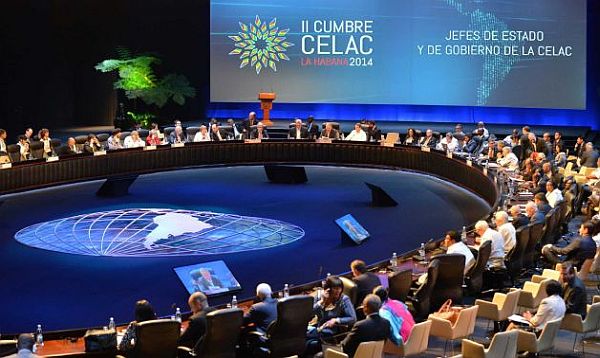Havana, Cuba - Leaders from across Latin America and the Caribbean signed a resolution declaring the region a "zone of peace" on Wednesday, pledging to resolve their disputes as respectful neighbors without the use of arms.
The joint declaration came on the final day of a summit of Western Hemisphere nations minus the United States and Canada, known as 'The Community of Latin American and Caribbeans States.' The grouping, conceived as a vehicle for regional integration independent of Washington's influence, was born in 2011.
The 33 nations gathered in Havana committed to nonintervention in each other's internal affairs, to cultivate cooperation and friendship and to respect "the inalienable right of every state to choose its political, economic, social, and cultural system," Cuban President Raul Castro said, reading from the text of the resolution.
Leaders have called the summit an attempt to seek unity amid diversity — both of which were evident in their remarks Wednesday. Heads of state gave speeches highlighting the need to solve urgent problems such as regional insecurity and economic struggles, and backing Argentine sovereignty over the British-controlled Falkland Islands, known in the Spanish-speaking world as the Malvinas.
 |
| Cuban President Raul Castro, right, talks with Costa Rica President Laura Chinchilla, second right, Mexico President Enrique Pena Nieto, left, and his wife Angelica Rivera, second left. |
Some left-leaning presidents railed against US domination of world lending organizations, cultural imperialism, consumerism, and "savage capitalism."
Conservative Colombian President Juan Manuel Santos, however, spoke of free trade's potential to spur economic growth. Uruguay's famously casual Jose Mujica delivered an impassioned denunciation of the business suit, one of the light moments of a mostly sober gathering.
"We are sure that by sharing experience between the nations of Latin America and the Caribbean, we will be able to enrich public policy in every one of our nations," said lame-duck Chilean President Sebastian Pinera, who sat next to his elected successor and political rival Michelle Bachelet.
Cuba is handing off the rotating presidency of the Community of Latin American and Caribbean States, or CELAC, to Costa Rica, which will host the next summit. The Central American nation's ambassador to Cuba met for about a half-hour Wednesday morning with two independent human rights activists to hear their concerns.
"We asked that under the pro-tempore presidency of Costa Rica, Cuba be encouraged to begin a process of gradual reforms on the issue of human rights," Elizardo Sanchez, head of the non-governmental Cuban Commission for Human Rights and National Reconciliation, said after he and his group's communications director met with the envoy.
The previous day, UN Secretary-General Ban Ki-moon said he had spoken to Cuban leadership during a visit and pressed them on human rights, free expression, and freedom of assembly. Cuba considers its small community of outspoken government opponents to be treasonous "mercenaries" bent on undermining the island's political system at the behest of foreign interests. Dissidents have reported increased detentions and harassment during the summit.
Earlier Wednesday, Castro, Venezuelan President Nicolas Maduro, and other leaders attended the inauguration of a museum dedicated to the late Venezuelan President Hugo Chavez, one of CELAC's staunchest proponents. The two-room museum in a Spanish colonial fortress in Havana covers the history of Venezuela and of Chavez, who died of cancer last March.
Permanent exhibits display personal effects including a military uniform and shoes. Every month on the 28th — the day of Chavez's birth — a Communist youth group is to hold a public act in his honor. Chavez was a close ally of Cuba and considered Fidel Castro a friend and mentor. Venezuela has supplied Cuba with billions of dollars in cut-rate oil in recent years.
Original Story


